




Arizona-based Bashas’ Supermarkets is celebrating its 90th anniversary in 2022. Bashas’ President Edward “Trey” Basha recently visited with The Shelby Report of the West’s EVP Bob Reeves about the history of the company.

Trey Basha’s grandfather, Eddie Basha Sr., and his great-uncle, Ike Basha, both the sons of Lebanese immigrants, started the company in 1932 on Alma School Road in what was then Goodyear, Arizona. The town was the home of The Goodyear Tire and Rubber Co., which was growing pima cotton in the area and also experimenting with rubber trees.

Basha said there were more people working there than lived in Chandler, Arizona, which drew his grandfather and great-uncle to choose it as the location for a grocery store.
“At one point in time, he and two other partners were considering buying Coney Island,” Basha said. “But his mother told him it would be a poor investment.”
When his great-grandfather’s warehouse burned down, he had no insurance and couldn’t collect on any loans because they were unsecured.
“He was left destitute,” Basha said. “They had nothing.”
His great-grandmother had a sister living in Congress, Arizona, which is near present-day Prescott. Congress was a mining town. The Bashas moved to the area in 1910 and opened two mercantile stores – which did not carry groceries – in Congress and another mining town, Basha said.
“My grandfather, Eddie Basha Sr., was the first Basha born in Arizona,” he said.

One night, a miner got drunk and burned down half the town, which included the Bashas’ store. The family opened a second store in downtown Chandler.
His great-grandmother, although proficient in languages, never learned to read or write in English.
“In those days, everyone bought things on credit,” he said. After the Basha children came home from school, they would go by the store and their mother would tell them who had come into the store and what they purchased, and they would write it down in the ledger.
“Some of their first customers were the Native Americans,” he said. “They brought their beef and their mesquite wood to trade for groceries. And we sold to the workers who were working here.”
That early relationship with the Native Americans was the foundation for the company’s future expansion serving the Navajo Nation, San Carlos Apache, White Mountain Apache and Tohono O’odhman Nations.
Basha said his great-grandmother and his oldest great-aunt spoke Pima, learning the language out of respect so they could communicate with the Native Americans who came in to do business.
“My great-grandmother was an amazing woman,” he said. “She spoke some Pima, she spoke English fluently, Spanish fluently and, of course, Lebanese fluently.”
Trey Basha said his great-grandfather, Najeeb Basha, was in the import-export business with his father, who brought him over from Lebanon when he was 16. He met his wife, Najeeby, in New York City. They came from different towns in Lebanon, but many ethnic groups tended to live in “little enclaves” within the city, Basha said. That enclave is where his great-grandparents met and married.
He said his great-grandfather was doing well and would make unsecured loans to people.
After the death of his great-grandfather, his greatgrandmother – the matriarch of the family – was left to care for several children, Basha said. They were inspired to get into the grocery business by observing the people going in and out of a grocery store across the street.
His great-grandmother, who lost her first child at a young age, had eight living children. Seven were involved in the business while the youngest, Zelma, who was also a budding artist, took care of Eddie Jr.
When Eddie Basha Sr. died at that age of 57 in 1968, Eddie Jr. took over the company, which had 16 stores at the time. Eddie Sr., who was “very entrepreneurial,” according to Basha, also had a dairy business. After Eddie Sr.’s death, the bank called all notes due, telling Eddie Jr. that his father was over-extended and they had no confidence in him.
Around April 1932, Basha said Eddie Sr. and Ike opened the first true grocery store for the family, which they then started expanding south.


“My great-grandmother would drive the truck to the produce market in downtown Phoenix at 4 a.m. to buy produce for this store,” Basha said. “Everyone worked in the store, except my youngest great-aunt, and her job was to babysit my dad because my grandmother worked as a cashier.”
Basha said a family friend, Adolph Weinberg, went with Eddie Jr. to the bank and co-signed all of the notes. Basha said Eddie Jr. worked through all of the issues and started to grow the company.

After noting a third-quarter drop in sales during the summer, Eddie Jr. and Ike began opening stores in the areas people went to during the summer – Sedona, Prescott, Flagstaff – to try to balance the volume, Basha said.
“He was very smart in that way,” Basha said. “He was also very good in real estate.”
In 2008, the company was continuing to do well in the first half of the year. However, during the second half, “building here in Arizona dropped off a cliff,” Basha said. “It didn’t just slow down, it just ended.”
In October, Bashas’ called a meeting with its lenders and told them the company would be unable to make its covenants in 2009, he said.
vendor community, even though it was not required to do so. Basha said he attended a meeting with some of the company’s smaller creditors.
to accept that meeting, which we did.”
During the session, he said one of the first topics Raley’s President and CEO Keith Knopf talked about was how Raley’s takes care of its people and how the company serves the community.
“The first thing they put on the table was not their financial strength or their abilities, it was, ‘We take care of our people, we serve our communities,’” Basha said. “What we saw was a similar culture.”
He said they also saw a pathway forward for their employees and that the management group would stay intact. For Raley’s, the purchase was about adding scale, increasing capabilities and expanding its footprint.

As the U.S. went into a recession, the company’s largest vendors put Bashas’ on cash and prepay, which “took $20 million of liquidity out of the company immediately,” Basha said.
The company filed Chapter 11 in July 2009.

Basha said once the company entered Chapter 11, it was decided they had to make it work.

“We had thousands of people depending on us for their livelihoods,” he said. “We had people that we owed money to. We needed to make it work.”
He became the point person for the family. Prior to that time, he had been working with the company more in the legal and finance areas.
Bashas’ proposed a 100 percent payback to the
“We realized that they were hurting as well,” he said. “Arizona caught a cold, and we went on life support. A lot of the smaller vendors were really hurting. The larger vendors, they were going to sell their products – if we went away – through the rest of the competition. Some of the smaller vendors might not.”
The company paid back all its debts, with interest.
After coming out of Chapter 11 and with all of the company’s creditors paid, Basha said the company’s ability to grow and expand was “hobbled.” The COVID-19 pandemic also brought home the reality of Bashas’ “being a small regional player,” limiting their ability to serve, he said.
“We weren’t getting the supply that a lot of our larger competition here was receiving,” he said. “So when Raley’s approached us, we had a fiduciary duty
“It was a very elegant solution,” said Basha, adding that several of the company’s shareholders preferred not to be in the business following the Chapter 11 filing and the focus on paying down debt.
He added that Raley’s also committed to keeping Bashas’ formats – Bashas’, Bashas’ Diné, Eddie’s Country Store, Food City and AJ’s – and wanted to “keep and honor the Bashas’ name.”


The late Eddie Basha Jr. has been inducted into The Shelby Report’s Food Industry Hall of Fame.

Basha Jr. died in 2013 at the age of 75.
Born in 1937 in Arizona, he carried on the family legacy of operating Bashas’ Supermarkets, growing the company and acquiring Food City and AJ’s Fine Foods.

Trey Basha, Eddie Jr.’s son and president of Bashas’ Family of Stores, shared some insight into his father’s life story. Also offering some of their memories were his brothers and their cousin, Johnny Basha.

Eddie Jr.’s great-aunt Zelma took care of him while he was growing up, as the rest of the family worked in the grocery stores. It was Zelma, a budding artist, who inspired a love of art in Eddie Jr., Trey Basha said. She would draw pictures to entertain the youngster.
“Zelma and my dad formed a very unique relationship,” Basha said. “She really challenged my dad.”
Zelma was the reason Eddie Jr. went to Stanford University, he said.
When he came back from the university, she told him that he needed to start collecting art as a hobby. The two of them attended an art show in Laguna, California.
“They viewed all these different genres of art,” Basha said. “There were two small cowboy bronzes, and Zelma looked at him and said, ‘Eddie, that’s it. You should collect Western art. So he bought those two bronzes and the gallery is a result of 40 years of collecting art.”
Those bronzes are still in the Bashas’ art gallery. The Zelma Basha Salmeri
Gallery of Western American and Native American Art features oil paintings, watercolors, acrylics, pastel and charcoal drawings. There also are pen and inks, bronze, wood and natural stone sculptures and wood-turned bowls, as well as basketry, pottery, kachinas and jewelry.
The museum has more than 3,000 pieces of art. It is open to the public during weekdays, with free admission.
Basha said his father became a mentor for several cowboy artists and the family became friends with many of them.
“You can see their personalities in their art,” he said.
Art was just one of Eddie Jr.’s passions – education was the other.
A history major in college, Eddie Jr. “was never fond of European or colonial history,” Basha said. “He was always enamored with the history of the West.”
Eddie Jr. was a “huge proponent of public education,” Basha said. He served for 13 years on the local Chandler school board, eight years on the Arizona Board of Education and eight years on the Arizona Board of Regents.
Later in life, along with second wife Nadine – who also was an early childhood education advocate – he brought together a statewide initiative to raise money for early childhood education.
“It was part of who he was,” Basha said of his father.
Eddie Jr. received honorary doctorate degrees from all three state universities in Arizona.
When Eddie Basha Sr. died at age 57, Eddie Jr. took over the company, which had 16 stores at the time. Eddie Sr., who was “very entrepreneurial,” according
to Trey Basha, also had a dairy business. After Eddie Sr.’s death, the bank called all notes due, telling Eddie Jr. that his father was overextended and they had no confidence in him.
Basha said a family friend, Adolph Weinberg, went with Eddie Jr. to the bank and co-signed all of the notes. Basha said Eddie Jr. worked through all of the issues and started to grow the company.
Food City became part of the Bashas’ Family of Stores in the mid-1990s. The original Food City at 16th Street and Mojave was owned by Noah Billings, Basha said.

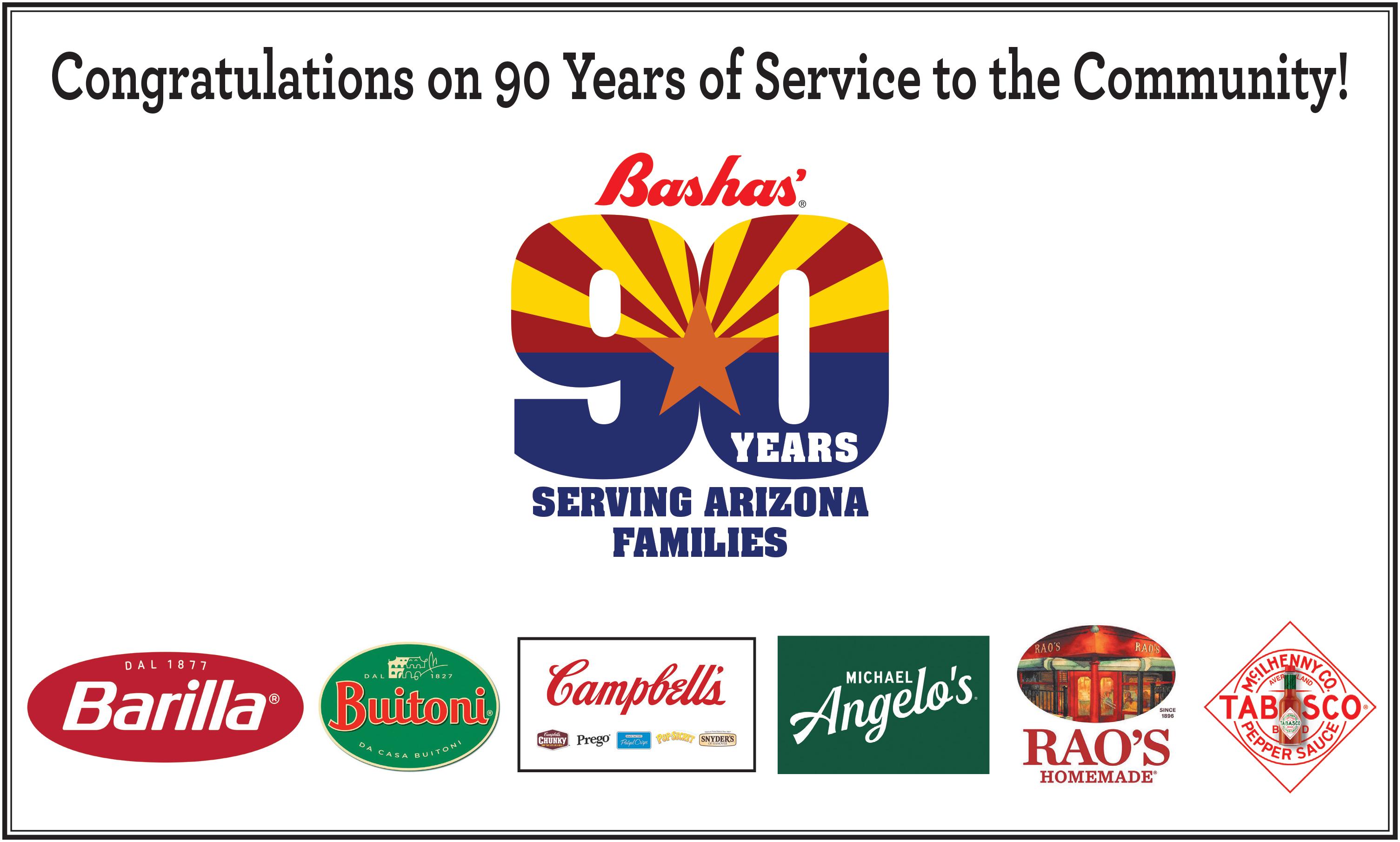
“He came to Eddie and said, ‘Eddie, I want you to buy my store.’ And my dad said, ‘OK, Noah, why me?’ And he said, ‘Because I know you’ll treat my people right.’ And so that’s how we ended up with the Food City format,” Basha said.
Johnny Basha is a cousin but considered Eddie Jr. as a father figure after losing his dad when he was 4.
He shared a story of accompanying Eddie Jr. to visit the sixth store Bashas’ opened on the Navajo Nation, in Dilkon, Arizona.
The chairman of the nation and Eddie Jr. were dear friends, Johnny Basha said, and Eddie was there as chairman of Bashas’.
“Here is this shopping center on the Navajo Nation, brand new, millions of
dollars spent building it. And here’s a brand-new Bashas’ store, millions of dollars of equipment inside that we paid for and all of the product,” Johnny said.
The Navajo chairman looked at Eddie Jr. and said he didn’t recall seeing a lease come across his desk, asking if someone else had signed a lease, Johnny said.
“He looks at the chairman and says, ‘You know, I don’t recall signing a lease either.”
Johnny said they both looked at him and the director of economic development and asked, who signed the lease?
“And we go, there is no lease,” Johnny said. The chairman looked at Eddie Jr. and “they both started cracking up, saying ‘we have no lease.’ They hugged each other and called each other brother. And that’s how the deal got consummated.”
Johnny said he would never forget that relationship they had in a handshake.
Ike Basha said Eddie Jr. had an amazing gift, where he could look at assets – any assets – and come up with ways to use them that “made all the sense in the world.” He gave an example of when Eddie Jr. was serving on the Chandler school board and recommended the school system lease the buildings on the weekends, so churches and other groups could use the auditorium that was sitting idle two days a week.
“That’s just one example,” Ike said.
“There are countless examples of his ability to look and see and find utilization for idle assets. He was amazing with a set of plans. He could rearrange a store and add linear footage in his sleep. It was great to watch.”
Michael Basha recalled how the art gallery came about. Eddie Jr. had moved from a small house to a larger one and they were trying to figure out how to get the paintings on the walls.
“We just had these big collages,” he said. “I think he just finally outgrew the space.”
Eddie Jr. started filling space in the warehouse that used to be the distribution center but was no longer in use. He put some false walls in and started putting out the art. He used the space for philanthropic events.
The gallery has been expanded several times and is open weekdays and free to the public.
Ike Basha shared a story of his father, who was a “legendary prankster.”
“He was a practical joker,” Ike said. “He would call up and he would assume different voices, different accents and convince people that he was someone else.”
Trey Basha added that caller ID became the bane of their father’s existence “because then people knew the number that they were receiving.”
Ike said at Christmas one year, Eddie Jr. sent his assistant out to shop for “the most gosh-awful Christmas gifts she could find and tasteless, horrible, bad art – cheap.”
“He sent these gifts to friends from other friends. He created this network of gifts, these horrible gifts that these people received at Christmas,” Ike said. He said one woman called the person whom she thought had sent the gift and
Please see page 24
From page 23
asked why he would send her such an ugly necklace. “The gentleman said, ‘I didn’t send you anything for Christmas, let alone send you something gaudy.” It all started unraveling from there.
After serving on several educational boards, Eddie Jr. made an unsuccessful bid for governor of Arizona in 1994. His opponent, who won the election, was later indicted, convicted and sent to federal prison.
Trey Basha said Eddie Jr. knew about some of the alleged charges “but refused to bring those up as part of the campaign because he wanted to win on his own merits as opposed to disparaging his opponent.”
He said his father was going to run again in 1998, but he didn’t want to run against his friend, Jane Hall.
Mike Basha recalled the time they were getting ready to open the first Navajo Nation store, which was in Chinle, Arizona. It was 1982 and he was 15. His father didn’t want to fly because he was “deathly afraid” of small airplanes.
They made the several hours long drive up there and stayed overnight in a motel. His father told him there were no twin beds but they both would sleep in
the king-size bed together.
“My dad, he snored. I don’t think I got a wink of sleep that night,” Mike said. “After opening the store, we made the long drive home.”
Eddie Jr. eventually overcame his fear of flying in small planes and the company had its own aircraft. About 10-12 years after their trip together, Eddie Jr. and Mike were flying up to one of the Navajo stores. “He said, remember that time we drove to Chinle? Why was I so afraid to fly? It’s so much faster to get to the stores this way.”
David Basha is the youngest of the four older boys (Eddie would later have two additional sons with his wife, Nadine). He is five years younger than Michael, six than Ike, seven than Trey.
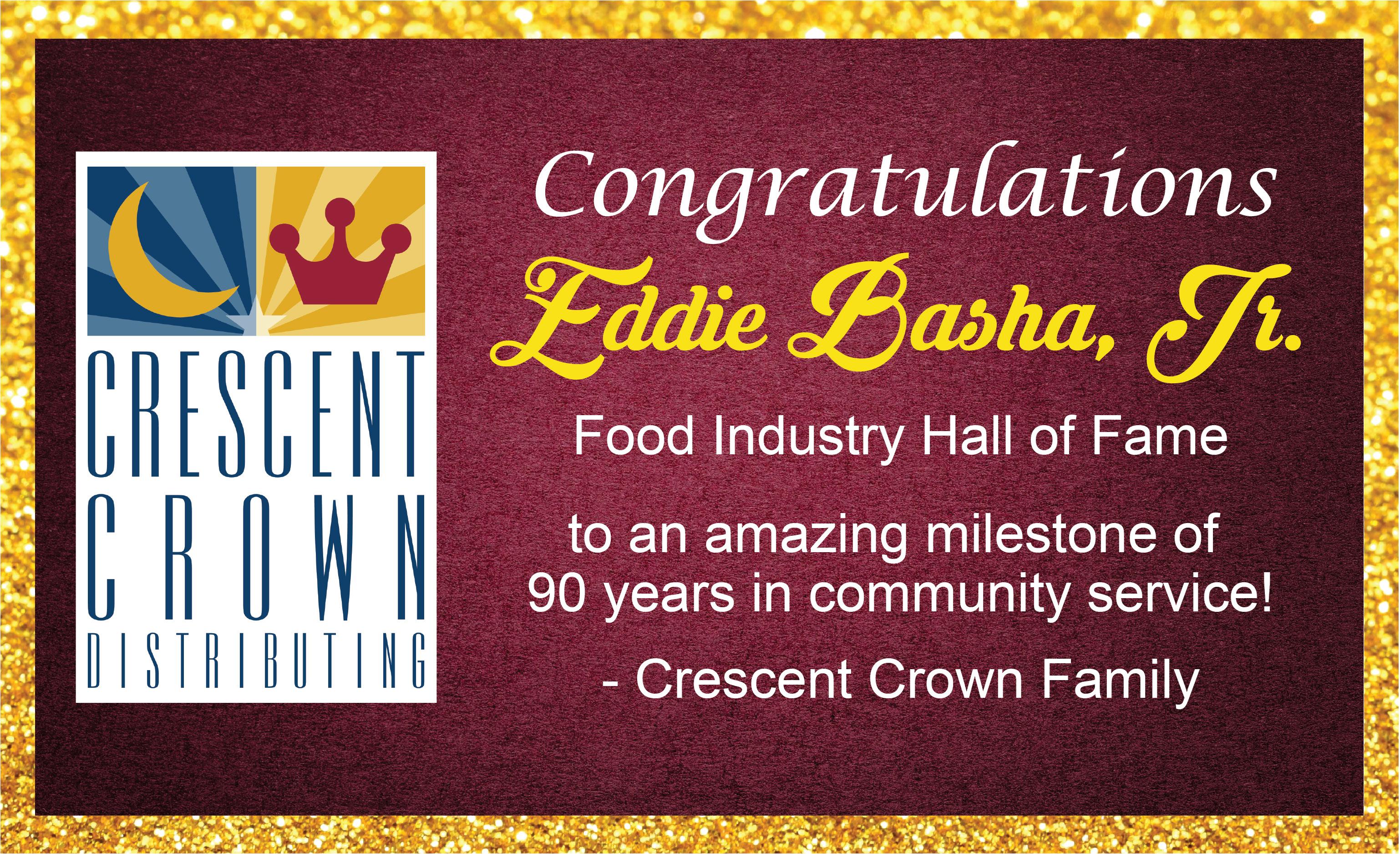
He said because of the age difference, his older brothers would pick on him. He would cry to his dad about it.
“My father told an elaborate story to me as a child and said, ‘Look, your mother was married before. And she had married a pilot, who unfortunately was shot down in the Vietnam War. And his name was Major McPherson, and your mom and Major McPherson had three sons. And when I met your mom and married her, I adopted those three sons, but you are my only son. You are my true son,” David said, adding he bought the story “hook, line and sinker.”
He said when they gathered at the dinner table at night, after dinner he would climb into Eddie Jr.’s lap and look at his brothers and say, “Only my dad. Only my dad.”
David said he believed the story for years. The truth came out during a visit with a cowboy artist friend of Eddie Jr.’s who had come to visit with his wife and mother-in-law. The mother-in-law was introduced as Mrs. McPherson.
“I lit up like a Christmas tree,”
David said. “I looked up at my dad and asked if this was the boys’ grandmother. I think finally that’s where he had to break it to me that it was an elaborate lie. But he would tell you it was the best thing for my self-esteem growing up.”
The Basha brothers have many fond memories of their father, but remember him most as a loving dad and a man of great character.


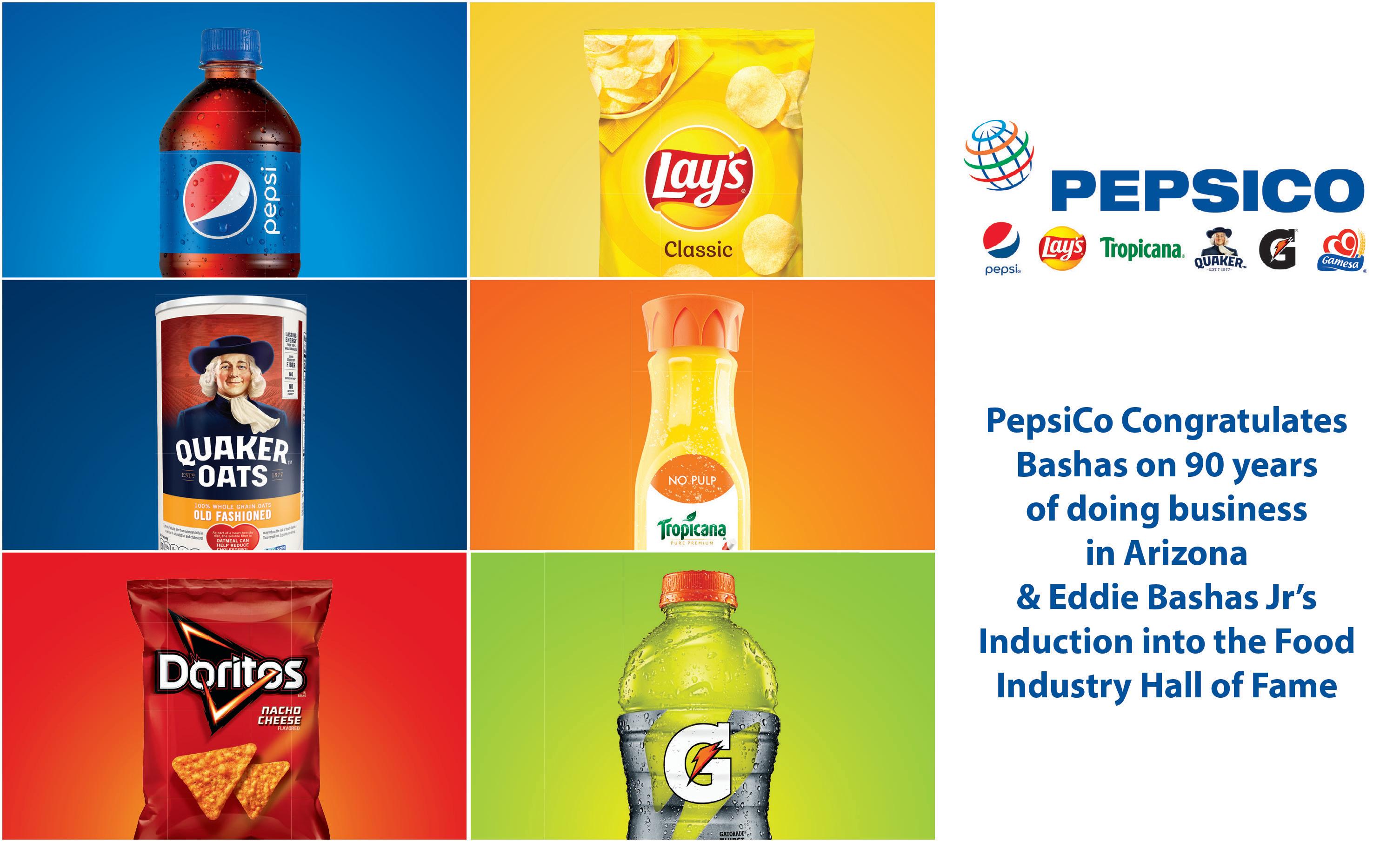
Bashas’ Family of Stores was sold to The Raley’s Companies in late 2021. Keith Knopf, president and CEO of the Northern California-based organization, and Trey Basha, president of Bashas’, recently sat down with The Shelby Report of the West’s EVP Bob Reeves to talk about the acquisition and the future of Bashas’.

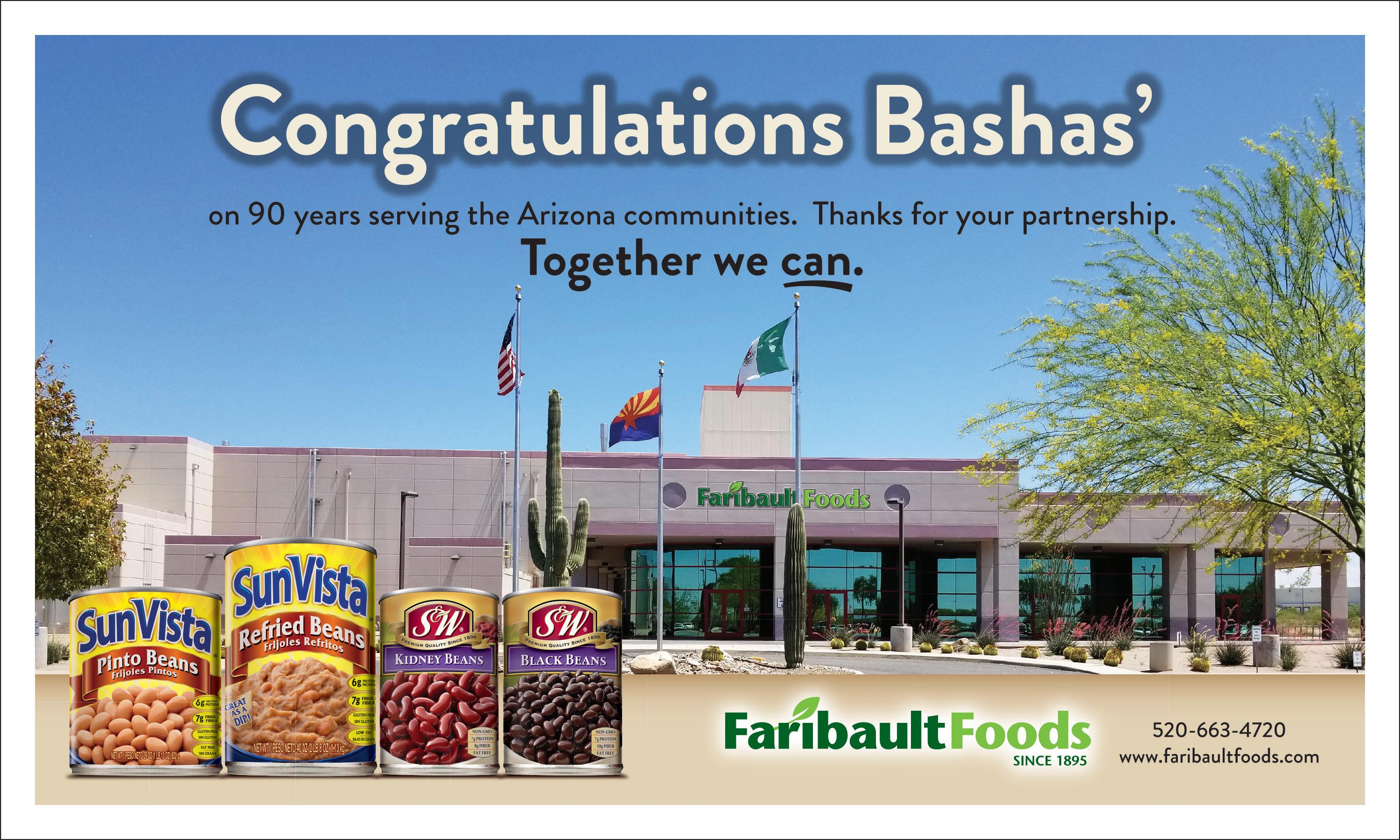
in 2015, then was named president a year later. About a year after that, he was named CEO of Raley’s. As the company began to grow through acquisition, it formed a holding company and an enterprise shared services group. The totality of which is known as The Raley’s Companies.
Knopf is the president and CEO of The Raley’s Companies, which is a portfolio of retail, technology development and services, production and logistics. The company is owned by Mike Teel, who also serves as the chairman of the board.
According to Knopf, he and the leadership team at Raley’s put together a long-range plan in 2018.
Elements of that plan included growth through acquisition, market diversification, creation of a technology development and services entity, as well as acquisition of capabilities such as artificial intelligence in the space of pricing and loyalty, wholly owned “gig” delivery to support their already great e-commerce offering, and the addition of a best-in-class subscription capability and the leadership expertise to leverage and grow in this channel.
Among the guiding principles – the people matter most, established and strong brand equity, already well run with even more potential to unlock and to preserve and elevate that which was acquired and to respect the legacy.
portfolio, Knopf said.
Knopf said he believes that the grocery sector in the United States will eventually be occupied by meganationals, pure-play tech operators and super regionals. Companies inspired by a purpose, in Raley’s case, “Changing the Way We Eat, One Plate at a Time,” will have a competitive advantage.
The super-regional companies “have necessary scale to compete against the large nationals but are also agile and highly tuned to the customer needs and expectations. In summary, they are big enough to compete but local in mindset and approach when it comes to treating our team’s members with respect and being a valued member of the community. And in The Raley’s Companies case, also possessing the skill and technical capability of any other in the market place,” Knopf said.
Guided by the set of principles framed in The Raley’s Companies long-range plan, Knopf said he and team began looking for other well-positioned independent – preferably family-owned companies –that were similarly situated.
Knopf, who had a background in apparel before joining the grocery industry, became COO of Raley’s
By the fall of 2020 much of the plan had come to fruition or was in flight. What came next was an overture to Bashas,’ which led to a 15-month exploration and decision that brought Bashas’ and its 113 stores and 8,500 team members into The Raley’s Companies
The then Raley’s Companies CAO, Jen Warner (recently promoted to president of Raley’s), the much experienced and tenured CFO, Ken Mueller, and the CHRO Laura Croff did the heavy lifting. All along the way Chelsea Minor, The Raley’s Companies head of public relations and governmental affairs, helped navigate the industry and the rumor mill.
While the growth journey for The Raley’s Companies does not end with Bashas’, it was clear
Please see page 28
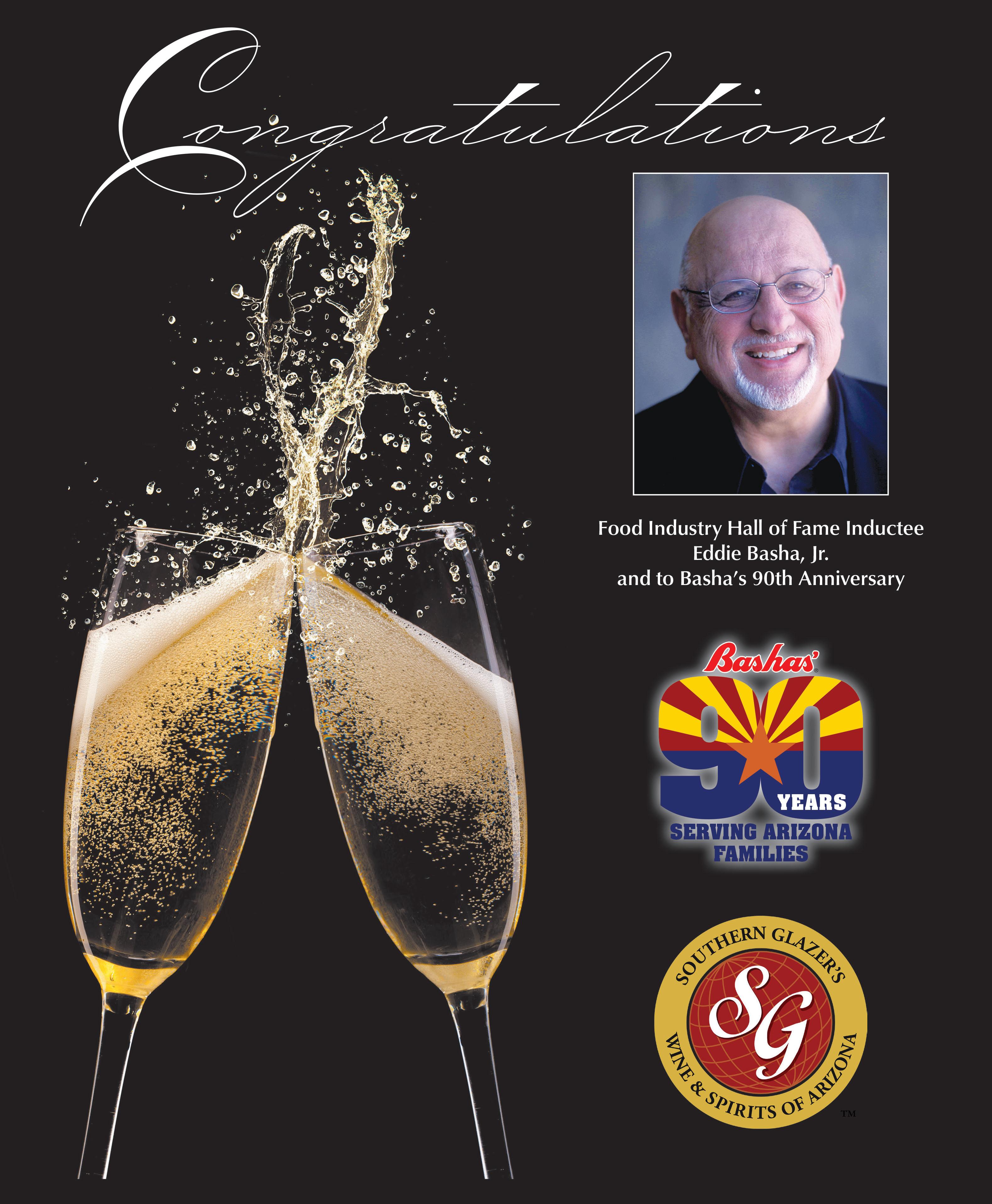
From page 26
that Bashas’ was an obvious fit. A successful organization, steeped in a positive and 90-year family legacy, seeking its own path forward.
Consistent with the strategic growth guiding principles, Knopf said The Raley’s Companies values the expertise of the Bashas’ executive team and is committed to maintaining the office in Chandler, Arizona.
In fact, a new Bashas’ corporate office in Chandler will be announced in the not-too-distant future.
“This is not Raley’s east, it’s Bashas’,” Knopf explained. “We didn’t buy Bashas’ to make it Raley’s. We have no intention of bringing Raley’s into Arizona. We value all that Bashas’ is and we look forward to helping it become the next best, bigger version of itself. And we’ll work on that together.”
Knopf said the two markets are similar in many ways, with much of the same competition.
“What is brilliant about the strategy that Trey and his family put in place is how they looked at the market in segments,” he said. “They built brands to serve different customers’ needs and wants. Bashas’, Bashas’ DINE` Market, Food City and AJ’s are each uniquely positioned. Each has its own brand ethos but is connected through a talented and dedicated support team. This positioning, along with the digital assets and direct-to-customer acumen and leadership experience of The Raley’s Companies, will make for a powerful team.
“The Bashas’ stores serving various tribal communities also were a draw for Raley’s. It is truly a privilege

to serve the tribal nations. It is a unique relationship that Trey and his family created 40 years ago, and it’s an honor to be part of its stewardship.” (See related article on page 38.)
Knopf said together, The Raley’s Companies including Bashas’ is stronger and more resilient. Among the intrinsic value of the partnership is the obvious increase in purchasing power. By collaborating on procurement, the companies realize better pricing. This said, merchandising decision-making still resides with each operating company. Moreover, savings are being realized on non-retail operating costs as well.
But the benefits go well beyond cost and expense, Knopf said.
well-being; and Bashas’ on how to compete in a marketplace where other national grocers “hold the high ground.”
In addition, The Raley’s Companies has long held a top-rated digital customer experience. According to Deirdre Zimmermann, chief customer experience officer, those assets and capabilities will soon be incorporated into Bashas’. This is another example of accelerating speed to market in an efficient manner.
But The Raley’s Companies did not just jump in; according to Knopf, “We took the first six months to assess and learn. Our goal was and is to preserve and expand the best thinking and practice, regardless of where it came from. Like our mindset in California and Nevada, a comprehensive wage and salary analysis was completed and then a sizable investment made to ensure all our Bashas’ team members were on par or better than the respective market.
“A systems platform review was conducted by Craig Benson, The Raley’s Companies CTO, and the optimal solution adopted, and integration path charted. In some cases, the Bashas’ platform was the preferred and in others the Raley’s.”
The collaboration across the portfolio and the expanded knowledge and experience base have created great opportunities to learn from each other. Each operating company and brand within does something exceptionally well. This has created a kind of “internal share group.”
Knopf said Food City is fantastic at curating Hispanic offerings; AJ’s epicurean gourmet; Raley’s leads the market in health and wellness products and customer education on how food effects health and

When it came to people and leadership, “I believe in the integrity of the marketplace,” Knopf said. “I believe that people who understand the customer, who work closest with the stores, who live in the communities are the best positioned to decide how to go to market.”
Out of this perspective, incumbent Bashas’ leaders were engaged and retained, although some had reporting relationship changes given the The Raley’s Companies Shared Services leadership team.
Knopf added that The Raley’s Companies leverages a Shared Services Leadership team. This team comprises finance, human resources, technology innovation and support, legal, risk and asset protection, public relations and governmental affairs, strategy/PMO and digital direct to customer/marketing/ e-commerce. They help shape strategic direction and provide all the support services so the in-market presidents and operating teams can focus on leading the business day to day.
“We don’t need to duplicate services,” Knopf said, “but we do need great merchants, great operators and great advertisers in each respective market, with a deep understanding, informed by experience and data under one strategic umbrella but still very nuanced to the market. Trey and his Bashas’ leadership team ensure that expertise and continuity.”
Knopf pointed out that Trey Basha has a counterpart at Raley’s, Jen Warner, who oversees operations for Raley’s operating company, including Raley’s, Bel Air, Nob Hill Foods and Raley’s O-N-E Market.

Reiterating that he has no intention of bringing Raley’s into Arizona or of changing the Bashas’ banners, Knopf said the goal is to preserve the Chandler, Arizona-based workforce and support center while leveraging the shared services team when and where it makes sense.
Trey Basha said that Knopf’s first presentation was about how Raley’s values its team members, how they take care of them, how they value and give back to the community.
“That was a very important first meeting and very important first consideration for the Basha family, because it showed the alignment of values,” Basha said. “Keith [Knopf] and The Raley’s Companies have done everything they promised and more – even faster than was expected.”
Knopf said he and Basha both believe that “if it’s
a partnership of like and fair-minded people, you can figure anything out. That was important to us. That was evident from the onset that this was a journey worth taking.”
Basha added that it was important to the family because the team members were so much a part of the company’s success over the decades and the family wanted to make sure they were taken care of.

Currently, Bashas’ management team is divided between the corporate office and the distribution center. According to Knopf, the team will have a new Chandler-based, modern office facility.
Chelsea Minor commented that an announcement will be made by the end of this calendar year. In addition, new store sites are also being evaluated.
Michael Basha, who leads the distribution center, trucking and repair maintenance group, will continue along with his team to headquarter out of the Bashas’ warehouse and logistic center, also located in Chandler.
“We look forward to opening additional Bashas’, AJ’s and Food City stores soon,” Minor said. There are several conversations already under way, according to Johnny Basha, head of real estate and strategic projects.
Knopf noted that it is “by the grace of Mike and Julie Teel that this goes on. It is their desire to serve the community and create great places for people to work and pursue their career aspirations. It’s their generosity
that makes it possible and we are proud of not just what we do but who we serve.”
Basha commended Knopf on putting together an “amazing team,” adding that Raley’s has a professional management team with the touch of a family organization.
“Our hope as a family is to see the legacy, the opportunity for our team members to continue in the future long after we’re gone,” Basha said. “The same way that the company continued after the original generations have left. It’s not so much about us, it’s about the people that we work for and the communities that we serve.”
The Shelby Report of the West’s EVP Bob Reeves recently toured a Bashas’ store in Chandler, Arizona, where he was accompanied by Ralph Woodward, SVP of operations for Bashas’ Family of Stores; Team Leader Kris Greco and David Herrera, director of operations for the conventional Bashas’ stores.
The Starbucks kiosk was the first stop, where they spoke with Lynn Engelke, director of Bashas’ Starbucks locations, which are in 32 stores.

morning, and then they stop back in, in the afternoon. It’s been a great addition to the stores,” Engelke said. “It definitely draws in a crowd and keeps them in here.”
Woodward added that there are Starbucks kiosks in three of Bashas’ Diné stores in the Navajo Nation.
“We’re the first grocer to open [Starbucks] in Native American Navajo stores,” he said. “We’re very proud and excited about that.”
Woodward said they also have opened a Starbucks in one of the company’s Food City stores.
As the walk-through continued, Greco – a native of Chandler – shared that he got his start with the company bagging groceries.
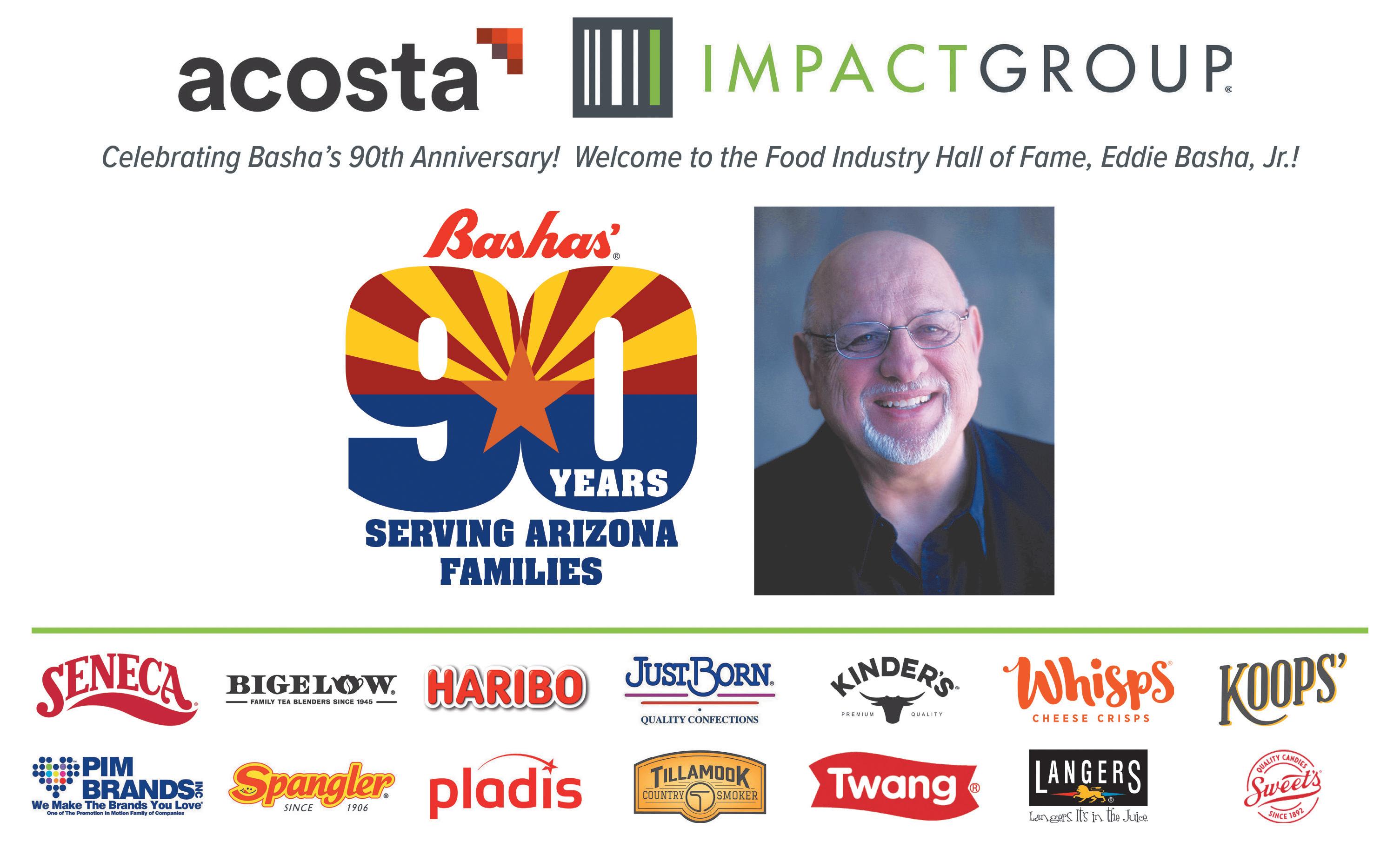
“My dad was a mailman for the local store director and said, ‘Son, you’re going to work and you start Saturday.’ I [did] and then never looked back,” he said.
Entering the bakery department, Misty Abella, director of Bashas’ bakeries, talked about the offerings available.
“We do scratch donuts here, which is different from all the competitors,” she said. “We mix it, we proof it, we fry it here.”
She said Bashas’ bakers make all their cakes in-store, along with pastries, and “we are all about fresh.”
Abella said their self-service or grab-and-go cases are popular, especially since the advent of COVID-19.
She said they never shut their pastry cases down, as many other stores did. Making their donuts in-house was a plus, as they did not have to rely on suppliers.

On Fridays, the stores have a “buy a dozen donuts, get six free” offer. Abella said that keeps them busy.
The Starbucks kiosks employ about 300 people company-wide, said Engelke, adding that “for Bashas’ and Starbucks, I think it’s a great marriage, a great partnership.”
“We do have a lot of regulars that come in every
She said Bashas’ is known for those donuts, adding they are free of preservatives. “It is a big chunk of our business, so we’re pretty proud of them,” Abella said. “We have a lot of varieties and we decorate here in the store.”
There are scratch bakers in every Bashas’ store, she said, noting that’s uncommon. Abella has been with Bashas’ since 2005 but has been in the bakery business since 1985.
“It draws them in, so we get a lot of traffic that comes through here,” she said.
Abella said they bake their breads daily, also.
“We’re proud of our bakers,” she said.
Bashas’ also sponsors a Donut Flavor Craze Contest for National Donut Day, which falls on the first Friday in June. The contest kicks off in April and winners are announced the week leading up to National Donut Day.
Please see page 32

Customers submit recipes and celebrity judges choose the winners in adult, youth and employee categories. Abella said the theme this year was Carnival.
On National Donut Day, Bashas’ donates 10 percent of its sales to The Salvation Army.
Entering the deli department, Jorge Alvarez, director of deli for Bashas’, talked about what’s special there. He cited oven-baked pizzas, the sandwich bar, fresh sushi, taco grill and hot case items, along with the cold service case that has fresh salads and Boar’s Head meats and cheeses.
The taco grill features: tacos, hard and soft shell; beef and sweet tamales; chile rellenos; pork carnitas, carne asada and more.
The sushi chef prepares fresh sushi each day. Alvarez said the sushi is popular and is up “double digits” versus last year.
The sandwich bar features a menu board, but custom-made sandwiches are an option. Alvarez said pre-made sandwiches, made each morning, are available along with specialty sandwiches.
The wine department features a selection of upper, middle and lower tier wines. A selection of microbrews is located adjacent, in refrigerated cases, and includes Arizona beers.
Alvarez was quick to tout Bashas’ $7 Solution, which is a whole meal for $7. Customers may select one of 10 different
entrée items and two of any sides in the case.
“You get a full restaurant quality meal,” he said. “And you know with today’s economy that’s really a bargain.”
Tina Gray, meat department manager, talked about popular items. She said the angus filet mignons are the best seller, with the carne asada and chicken thighs also doing well. On the weekend, it’s Bashas’ gourmet burgers that people enjoy.
They have a seasonal summer set, which runs from March to November, and then a winter set. Fresh seafood also is available.
Greco spoke to the differences between Bashas’ and its Food City brand. He said Bashas’ has an extended variety and features “hero items.” These are items made in-store, such as the fresh cut-fruit program.

“It’s a point of pride for us,” Greco said.
The summer focus is on produce, which is “our prime time to shine,” he said. “We’re running our summer savings program, where we’re focused in on produce. We have that responsibility of driving traffic to our stores during the summertime.”
Greco said there is a higher level of focus on organic and on local in the Bashas’ brand.
“We pridefully are one of the only retailers here in Arizona that will put organic up on the front page ad,” he said, noting that produce is locally grown.
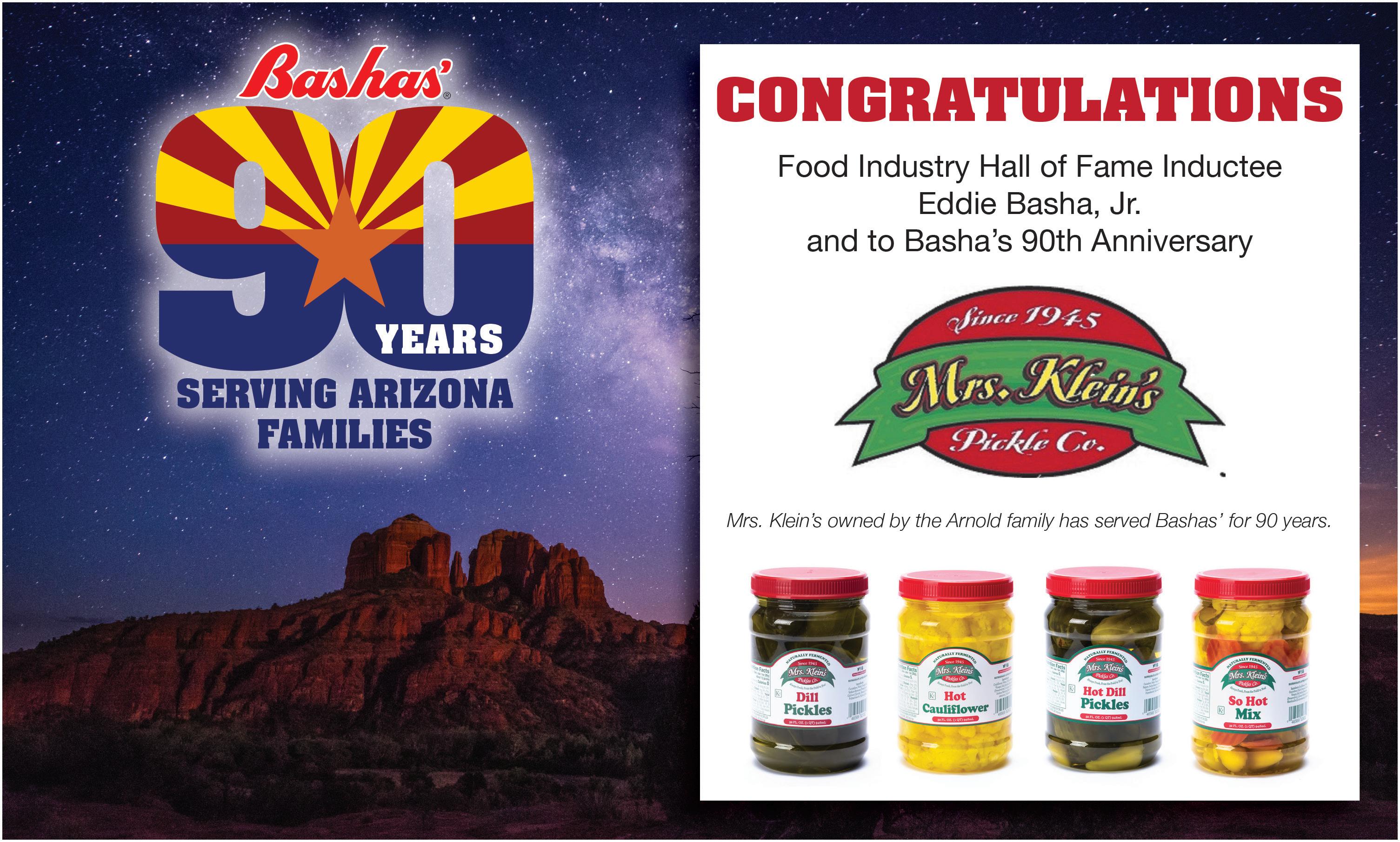

The layout of the product section is strategically planned out.
“Everything is allocated to present well and at the same time for the fastest turns,” Greco said. “We’re always having to put new product out in any given time…it all goes back to our lifestyle check – shelf life belongs to the customer, and we’re offering that through our merchandising.”
The store tour wrapped up in the floral department. Greco noted that when shoppers enter the store they “see the beautiful colors immediately” of the bouquets, roses and other flowers and house plants. Melissa Burrell, director of floral, mentioned the variety of offerings available for customers.
“We start our base levels right around $9.99 for a bouquet and then we’ll go on up to about $16.99 for a premium bouquet,” she said. “We’ve got what we call our growers bunch…and if there’s a particular flower that you like, you can mix and match the bunches at a great value. This program is in our Bashas brand and our Food City brand.”
The Shelby Report of the West’s EVP Bob Reeves recently toured Food City, a banner of Bashas’ Family of Stores. Mike Solis, director of operations for Food City, and Ralph Woodward, SVP of operations for Bashas’ Family of Stores, led the walk-through.

Bashas’ bought Food City, which caters to the Hispanic palate, in the mid-1990s. Solis explained the outdoor area is used to grill chicken for the store. The grilled chicken is a big signature item for the Food City delis.
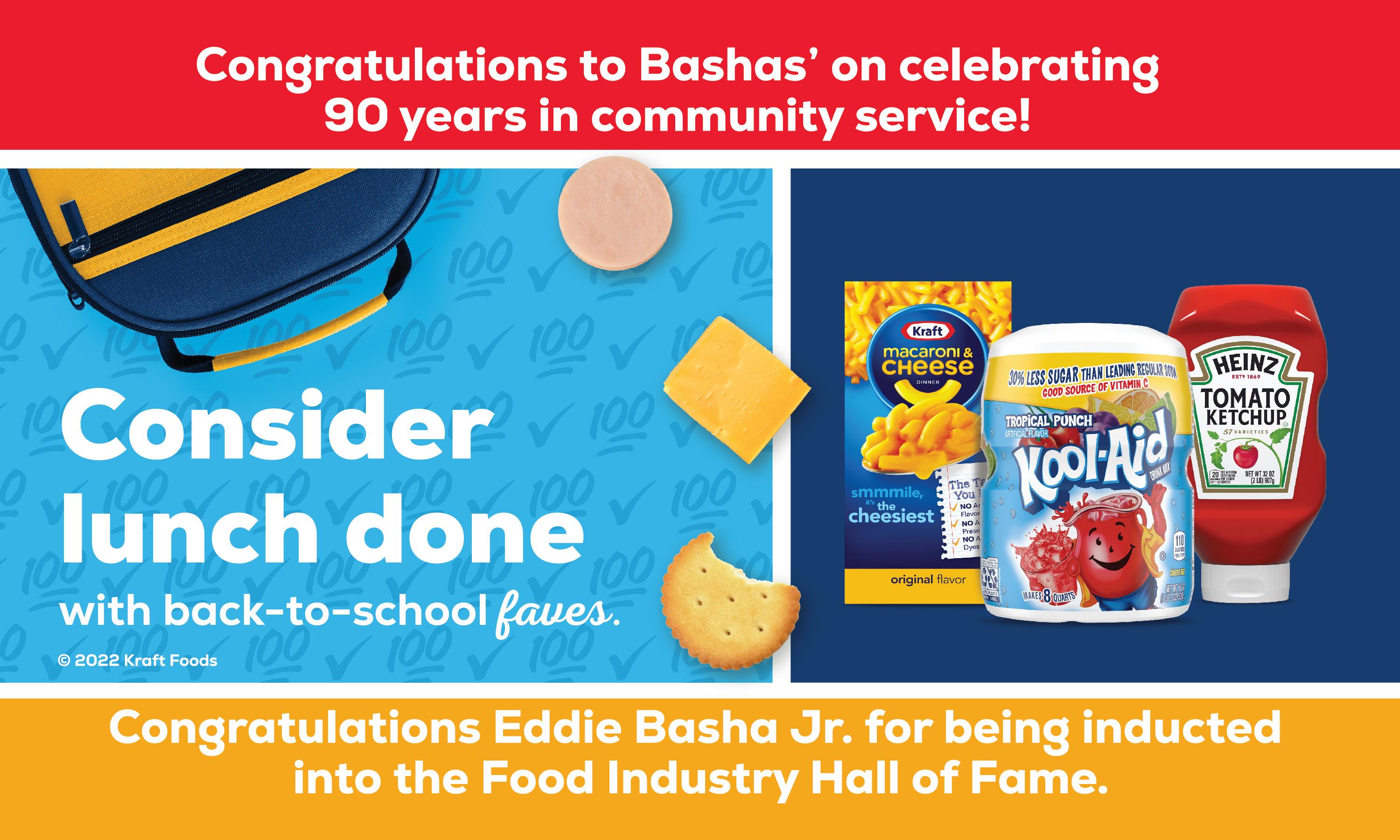
“The chicken is grilled over actual mesquite fire,” he said, adding there is a big following for Food City’s grilled products.
The grilled chicken is sold alongside rotisserie chickens. Woodward said he believed Food City’s grilled chicken is “far better than anything else in the market.”
The deli has a menu showcasing the products offered. Among other choices there are tacos, burritos and tortas, as well as breakfast made to order.
According to Solis, the product selection is consistent, with some changes seasonally such as during Easter and Lent. Tamales are popular during the holiday season. Soups are offered daily. The deli also has a catering menu.
A key driver currently in the deli area is the selection of agua frescas, Solis said.

“It’s a phenomenal product,” he said. “They’re very traditional, authentic type products.”
Solis said the drinks’ popularity has expanded from Mexico.
All items in Food City’s meat department are freshly cut in the store, Solis said.
Please see page 34
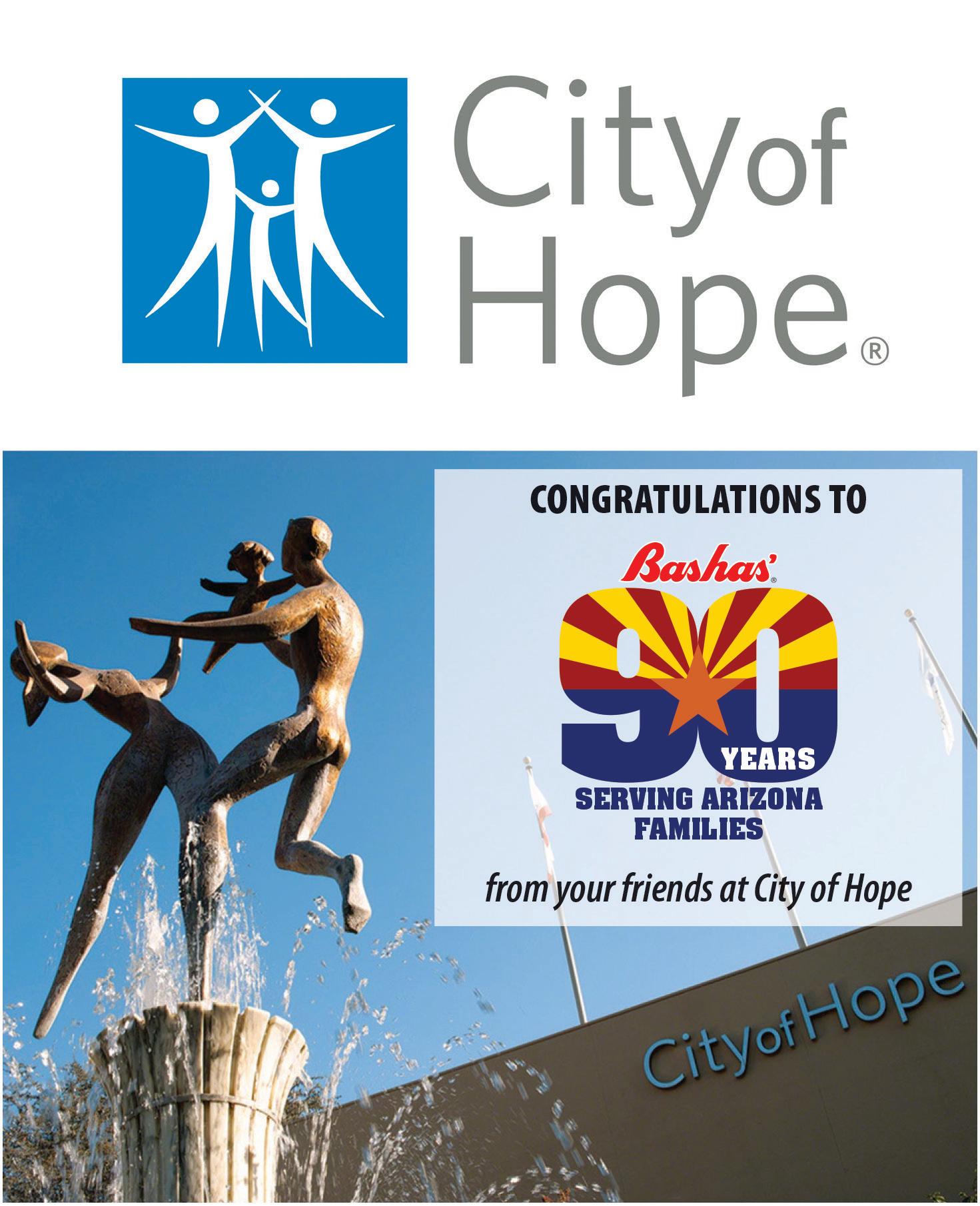 Ralph Woodward, SVP of operations
Ralph Woodward, SVP of operations
From page 33
“The variety of cuts that we have really calls out to our clientele…thin-sliced steaks, signature items like the skirt steak, which is very big for carne asadas; the chuck steak is the base core item when it comes to our products and clientele,” he said.
Food City carries a variety of beef, steaks, roasts, marinated chickens and steaks and in-house chorizo, a signature item that is extremely popular, Solis said.
Dan Hosler, director of meat for the company, said meat is sourced from across the country. “We’re always looking for price; we’re price conscious,” he said. “We’re not in any contract with anybody, so we just get it where we can get it. Our biggest supplier is JBS.”
Hosler said Food City carries select cuts and Mexican meat, which is not graded but extremely popular.
The department also offers a value priced Taco Box and Fajita Box for $20 each.
Many Food City shoppers have large families, so the value packs are popular.
Solis noted the Hispanic cheese variety program. “We have our private label and, of course, El Mexicano, the market leader for the branded cheese. It’s a strong, strong item for us; we sell it on tray packs…it’s just a great, great product and a lot of demand for that.”

Solis said Food City customers love to shop produce first, which is the stores’ big draw. Located at the front, the stores “really try to throw freshness in front of our customers,” he said.

“Our customers cook at home for their families day in and day out,” he said. “It’s just the way the culture is, and fresh produce is very, very important to them.”
Many customers prefer to buy their produce in bulk but like to “pick and choose what they’re going to take, instead of grabbing a bag,” said Gabe Flores, director of produce for Bashas’ and Food City.


Food City also carries some local produce, when available.
The produce department features many core items used for cooking ingredients – tomatoes, avocados, cucumbers, pepinos, soft squashes. The calabacitas are popular, as are onions. It features a signature set of different hot and bell peppers, as well as a large spice wall. During the holiday season, Food City will put up a stand and bag masa for customers near the tortilleria, Solis said. The masa is made in-store. Nixtamal is available. Corn tortillas chips – both thick and thin – are made fresh in-house every day.
Food City features a value aisle with base items such as rice and tomatoes that are core to what its customers want. The stores also carry private label brands, which include a mix of its own and Topco brands.

The store tour ended in the bakery, where a variety of made-from-scratch items are available, such as bilillos, conchas and cochitos, according to Aida Martinez, bakery merchandiser for Food City.

She said the cochitos, a cookie, are a very big seller.
Woodward likes the fact the items in the Food City bakery are “more bread and less sweet” than what’s found in a traditional bakery.
Martinez said the bakery has fresh fruits, leches and a line of tres leches cakes in several different flavors.
“We’re also known for a lot of color in our cakes,” she said.

The Shelby Report of the West’s EVP Bob Reeves recently toured an AJ’s Fine Foods banner of Bashas’ Family of Stores. He was accompanied by Ralph Woodward, SVP of operations for Bashas’ Family of Stores, and Jayson Mead, VP of AJ’s.

AJ’s, a gourmet market, became part of the company in 1993.
fruit and cheese can be included in gift baskets and AJ’s floral staff are educated on those options, Sandin said.
Peonies are a seasonal favorite and the department also offers roses and a selection of Hawaiian flowers directly from Maui. “We are one of the florists here in the East Valley and in Scottsdale that can purchase those,” Sandin said.
Pre-wrapped bouquets are available, but Sandin said they are “one on one with customers when it comes to floral delivery with types of arrangements. We’ll pretty much work hand in hand with all departments, especially with catering.”
Mead added it is a full-service flower shop. With COVID-19 having affected smaller flower shops, he said AJ’s is the “go-to now.”
“Again, we have a real focus on sustainability,” Mead said. He added they have several valueadded options, such as kebabs. “These are all our own recipes,” he said, noting they use local spices when available. “Just trying to make life easier on our guests.”
In the floral department, Mead and Lori Sandin, floral manager, discussed AJ’s popular gift baskets. Some are pre-made and others are customized to customer preferences. The baskets are very popular during the holiday season, for either personal or corporate gifts.


Items such as wine,
In the meat department, much is prepared in-house. Mead said seafood is delivered fresh six days a week. Much of AJ’s offerings are high end, such as dry scallops that have not been processed or treated, Mead said. AJ’s also has a heavy focus on a sustainable program, including wild-caught shrimp.
Prime beef is available, with some stores having dry aging rooms. Choice cuts are offered along with Alaskan salmon when in season. And there’s fresh, wild-caught halibut.


Because AJ’s is smaller, with 11 stores, there is more opportunity to have “mom and pop” businesses start there. He said as the local businesses are able to handle larger quantities they may be moved into the Bashas’ format. While the other banners offer organic produce, it’s a signature offering at AJ’s.
“We have a dedicated organic section,” Mead said. “Our focus is on specialty and premium – bringing the best of the best.”
Woodward added that the AJ’s staff does a good job with merchandising and vignettes. “There are themes, just like those gift baskets are themed about ice cream or movie night,” he said. “Their endcaps, their vignettes – they’re very good merchandisers.”
Moving into the wine department, Woodward said all AJ’s stores have cellar masters. “They are probably some of the most educated people in the industry,” he said.
Please see page 36
Lori Sandin, floral manager for AJ’s Fine Foods, and Trey Basha, president of Bashas’ Family of StoresFrom page 35
AJ’s carries high-end brands along with less expensive wines, offering a wide variety of choices. It also carries wines from small vineyards that produce for AJ’s.

Summer Wine Spectacular, sold out quickly, with 400 people in attendance.
He said the stores offer a program of 40 wines $13.99 and under. “Our team literally will taste hundreds of bottles to get to this,” Mead said.

“They do a good job tying the product in the store together with an event that also supports our charities and our community,” Woodward said. “It’s kind of a win-win situation.”

In addition to its wines, Mead said AJ’s has a great bourbon program. He said three team members would soon be visiting Kentucky, including the head of the cellar master program.
“They will actually taste single barrels and then they’ll purchase those, bring them back and they’ll be bottled for our guests as an exclusive to AJ’s,” he said.
Turning to AJ’s tequila program, Mead said last year they bought a barrel of bourbon then sent the empty barrel to Mexico, where it was filled with tequila. “We had a tequila that had aged in a bourbon barrel,” he said.
The store has a Cigar Emporium, which has lockers that used to be available to customers. Woodward said customers used to buy their cigars, lock them up and then stop by and get them at a later date.

Mead said during golf season a lot of golfers come in to buy a cigar or two for the course that day. He said between the cellar masters and their distributor, they work on having a “best of” program. “As cigars are rated, we really try to rotate in and out some of the top cigars,” along with the classics.
Another popular item in the store is its sushi, prepared daily by AJ’s sushi chefs.
The cellar masters have had a rosé program for about 15 years.
“They’ll taste through probably 100 rosés and then try to bring unique and specialty offerings that maybe the market hasn’t seen,” Mead said.
Mead added that AJ’s will have wine tastings in-store, with some locations having their own tasting bar. A special tasting event, the
Woodward said AJ’s does a good job with craft beer, offering a popular program where customers mix and match. Local breweries are also featured in the department.
“There are sushi restaurants around town, but I don’t think there’s one better than AJ’s,” Woodward said. “It’s just very fresh. The people are very skilled, very professional. It’s a great product, great quality, good prices.”
In the deli, AJ’s has an olive bar. Mead said they are still offering olives in containers as they have not gotten back to full service due to COVID. Woodfired pizza is available, made to order or by the slice. The deli features a sandwich program, along with salads.

“All salads are made in-house, so we have a salad chef at every store,” Mead said. “Typically, we average around 40 to 50 varieties of salad made daily.”
A soup bar contains eight kettles per day.
Chefs create entrees daily, highlighting different items.
“It’s a busy little place for lunch,” Woodward said.
Continuing the tour, Mead noted the tags denoting local products. There is a focus on going to farmers markets to find local producers and let them know they have an opportunity with AJ’s.
“We’ll spend the time and try to help them through the process, whether it’s educating them about certification they have to have, licensing and insurance.”
Moving to the center of the store, Mead talked about Chris Bianco’s brand of canned tomatoes. He got his start with his pizzeria in the back of AJ’s in its original format, before it was bought by the Bashas family. He later opened restaurants and was just nominated for the James Beard Award, Mead said.

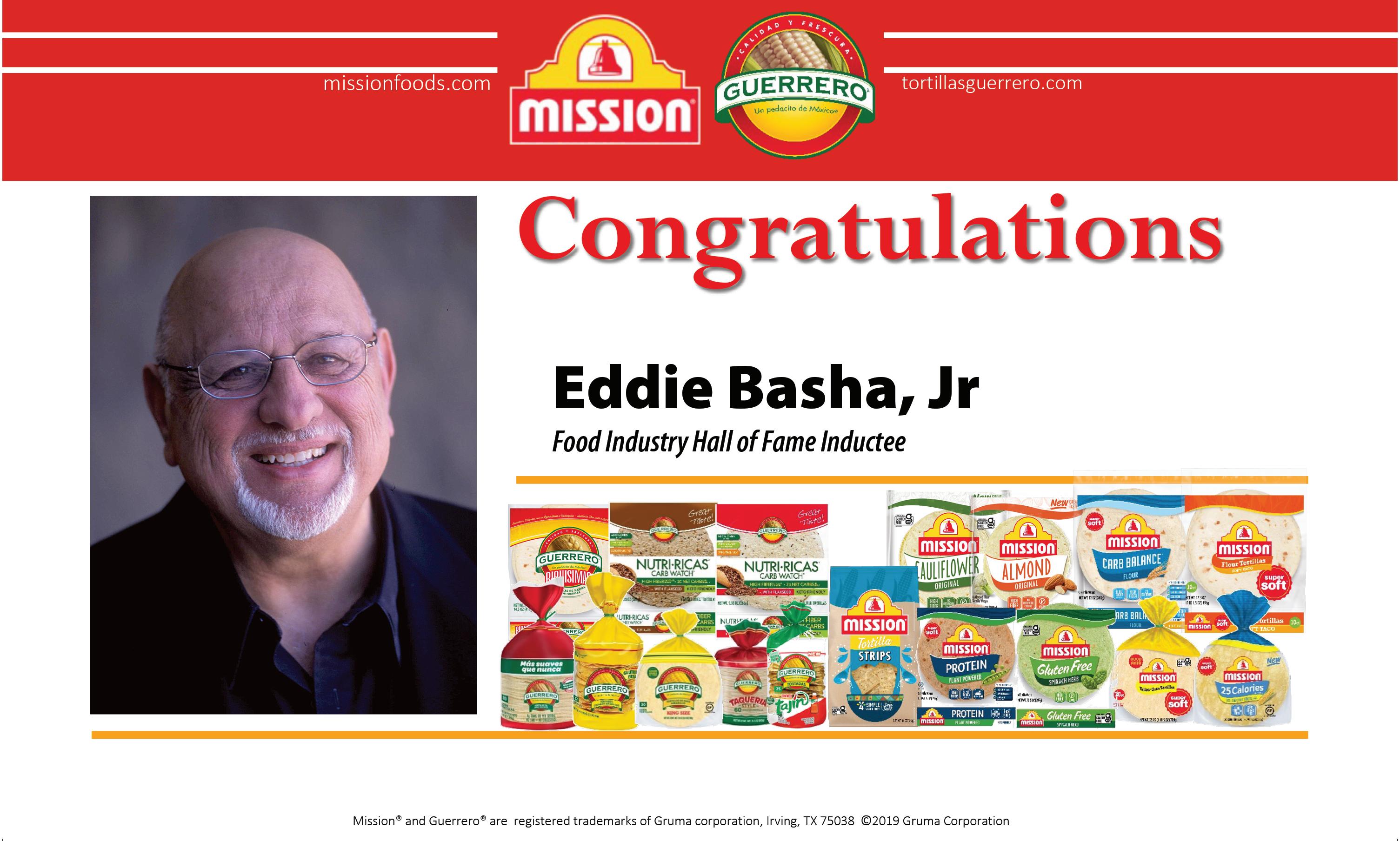
“That’s the cool thing about AJ’s,” Mead said. “Every aisle is like a little discovery. It’s really what makes AJ’s AJ’s. You come in, and you’re always delighted and surprised.”

He said that a buyer, Steve Lefevre, went to Italy with an importer and spent 14 days going from town to town. They visited two towns a day, meeting artisan producers of various products. AJ’s imports a container of such products a couple of times a year “to bring unique products to our guests,” Mead said.
In the oil section, there is a wide variety of olive oils, along with avocado, sunflower, sesame and almond oils.

Mead said they focus on educating the staff, having them go through and taste several of the oils to better serve the customers.
They also listen to requests, which is how AJ’s began carrying Tate’s Bake Shop cookies. “Years and years ago a customer actually brought them back from New England and said, ‘Hey, can you get these?’”
Jeni’s Ice Cream, based in Ohio, is another example. She came to their attention after one of their chefs was talking about her after an appearance on the Food Network. One of AJ’s buyers reached out to her to see if she was interested in selling her products in Arizona. She told them she had a large following of people originally from Ohio who now lived in Arizona.

“When he started canning his own tomatoes, he came to us and we started selling them,” he said, adding that they feature him and try to tell his story and include him in their events.
AJ’s selection of specialty chocolate bars, is “definitely one of the best in the country,” Mead said. He noted a brand made by a small chocolatier in Utah. “The owner used to call on us personally, and we would ship it over from Utah and bring it in,” Mead said.
“She said if you guys bring it in, I’ll share with my fan group that you guys have it,” Mead said. “So long story short, we brought it in…it was a smash success, just huge.”
Eddie Basha Jr. opened the first Bashas’ Diné Markets in the Navajo Nation in 1981. Currently, Bashas’ has nine stores to serve the Navajo people.
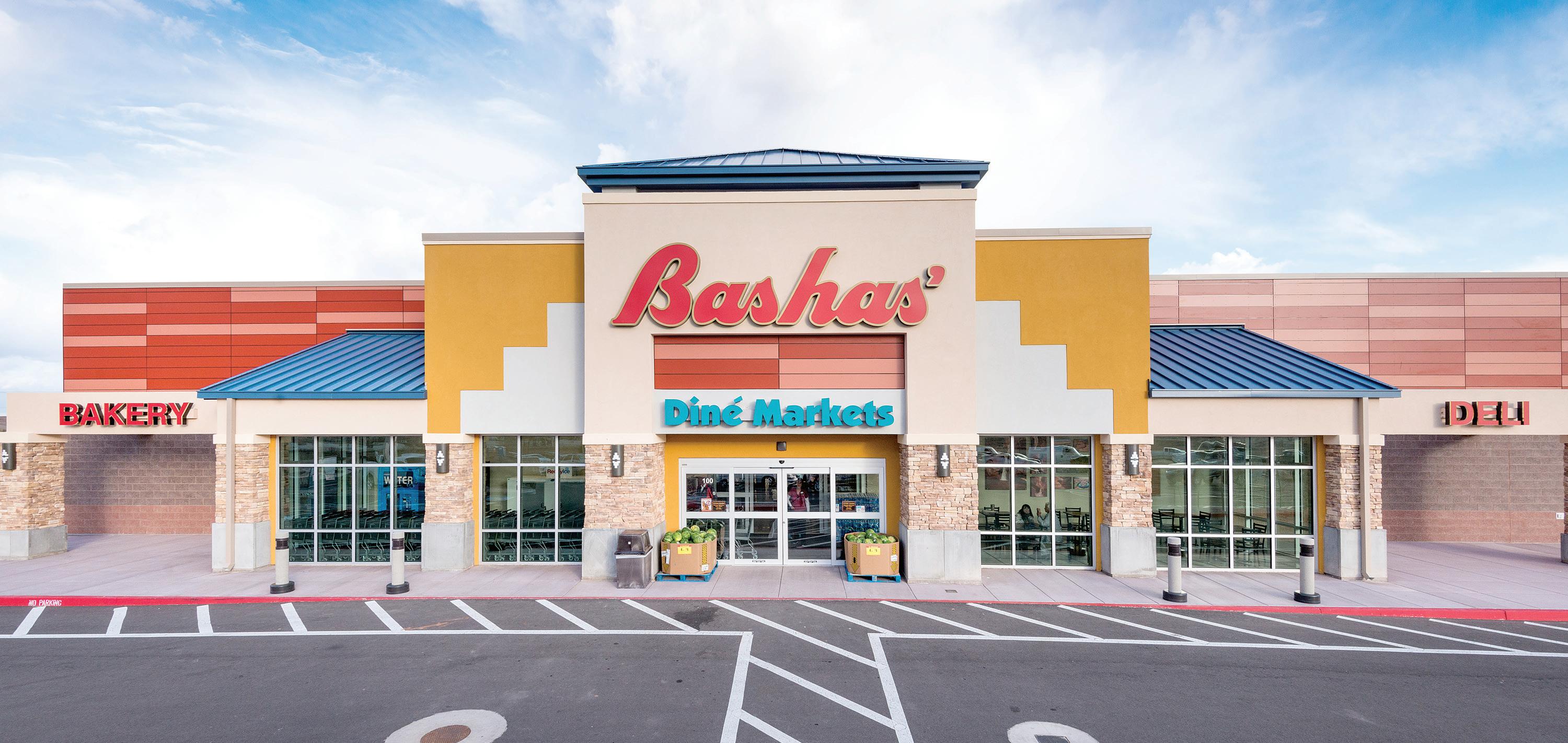
More than 40 years ago, the Navajo Nation put out a request for proposals to all the grocers. His father was the only one who answered, Trey Basha said. At that time, the Navajo Nation was a food desert.
Eddie Basha Jr. traveled to Window Rock and met

with the tribal leaders and told them he wanted to be their grocer.
“There were three things [my father] told me that he wanted to be remembered for when he passed away,” Trey Basha said. “One of those was bringing stores to the Navajo Nation. Because not only did we bring stores with fresh produce, fresh meat and a full contingent of groceries, but we also created jobs and
provided livelihoods.”
He added that part of the lease terms was that Bashas’ had to agree to different levels of employment of tribe members. All but one employee in the Navajo Nation stores is Navajo, Trey Basha said, but that man’s wife is Navajo.
Johnny Basha said his first cousin was committed to the Navajo people.
“Eddie wanted to provide groceries to the Navajo Nation,” Johnny Basha said. “He always said that the Navajos had to drive a long way to get groceries. They didn’t have electricity. They didn’t have refrigerators.
They had to use ice chests. They couldn’t eat perishables – fresh fruits and vegetables – every day. So it was Eddie’s thing to build grocery stores up there and provide good healthy food for the Navajo people.”
When opening a store on the Navajo Nation, the business committed to feed the people before they come and shop, Trey Basha said.
“That’s just part of the culture,” he said. “We would do this big luncheon prior to opening this store where we would feed all those who came out. The community comes out.”
He hearkened back to 50-60 years ago when the grocery store was the community hub, second only to church. “That’s the way it is on the Navajo Nation.”
He said leases are renewed every four years and Bashas’ has worked with a number of different tribal administrations. “It’s been an incredible relationship for us.”
Eddie Basha Jr. had great respect for the culture of the Navajo people and that has carried on. The Navajo Nation was “incredibly hit hard by the COVID virus,” said Trey Basha, adding that at one time the per capita deaths on the nation were greater than anywhere else in the U.S.


He said the tribal government pulled together and was doing a great job of protecting its people. Bashas’ also felt the importance of protecting its Navajo team members and customers.
“As a company, one of the things we did is put up the Plexiglass shields on the Navajo Nation first.” Bashas’ also rolled out all its sanitation efforts in its Diné Markets stores first.
The company also worked with the various tribal government entities to make sure it was complying and partnering with the Navajo Nation “to do all we could to protect our team members and our customers coming into the store,” Trey Basha said.


He noted that they have been remodeling the Diné
stores and “they’re just beautiful,” featuring artwork that represents that specific community. Also, some of the stores feature Starbucks kiosks. They drove the Starbucks representative to Window Rock and spent some time convincing them of the viability of placing a kiosk there.
“It was the first Starbucks on any Native American reservation anywhere in the United States,” he said. “It’s doing fabulous. We’ve opened two others since then and we’re planning a fourth.”
Bashas’ Diné Markets is the second largest employer in the Navajo Nation, second only to the nation itself.
Trey Basha said he used to joke that “Eddie Basha was the most popular man on the Navajo Nation, second only to George Strait.”
Johnny Basha added that, in his younger days, when he would go to the stores with his late cousin it “was like being with Clint Eastwood.”
Please see page 40
From page 39
“Everybody wanted their picture taken, they wanted his autograph. It was a huge, huge deal to the Navajos, especially the elders,” he said.
It was the elders who had to drive 60 or 70 miles to get to Flagstaff or another larger city to buy fresh fruits, vegetables and meat.
“It’s Eddie that brought the stores to them, and they loved him for that,” Johnny Basha said.

He added that when Eddie Basha Jr. took him to the Navajo Nation years ago, he taught him to always conduct himself as a guest on their land. He also taught him that if there was a cultural type of issue to overcome, it was his issue – not theirs.

When Bashas’ first opened its store on the Navajo Nation, company leaders learned that the Navajos have a matriarchal society. While they previously had many men as managers, they discovered having Navajo women as managers was “key to the success of our stores,” Johnny Basha said.

Bashas’ also has opened stores on the Apache reservations after being invited to meet with the tribal council.

Trey Basha said he drove with his father to the White Mountain Apache Reservation. During that first meeting, an auditor walked in saying he had just been to the store, saying there had been “about a million dollars of shrink out the back door, there’s
$250,000 in cash sitting in the safe… and there’s rotten meat on the shelves.”
He said the council erupted into speaking in the Apache language.
“Eddie’s there saying, ‘I’m here to be your grocer.’ So for the next hour, they grilled us about what we’re going to do and how we’re going to conduct ourselves,” Trey Basha said. “They would only give us a three-year lease because there was that little sense of mistrust.”
They operated on a three-year lease, which was renewed several times. Then they were out of lease, operating month to month for maybe 10 years. He added that Eddie Basha Jr. had a great relationship with the late Ronnie Lupe.
Please see page 42




From page 40
Lupe was “a powerhouse on the White Mountain Apache Reservation for many, many years,” Johnny Basha said. “And he trusted Eddie.”
His father also was contacted by the Tohono O’odham nation, asking for a meeting. They already had a building that they wanted Bashas’ to occupy.
“All of that was predicated upon our relationship with the Navajo Nation and that we had performed,” Trey Basha said.
In addition to the nine Navajo Nation stores, Bashas’ also has a store on the White Mountain Apache Reservation, as well as a store on each of the San Carlos Apache and Tohono O’odham reservations.







Girl Scouts Arizona Cactus-Pine, a community partner with Bashas’ for more than 40 years, was quick to congratulate the company on its 90th anniversary.
Co-CEOs Mary Mitchell and Christina Spicer said the Girl Scout mission is to build young women of courage, confidence and character, who make the world a better place.

“Bashas’ has been an incredible community partner, especially during our cookie program,” they said. “For decades, Bashas’ has allowed our girls to practice their entrepreneurial and business skills by providing opportunities to booth in front of their stores.
“With this permission, they have helped us to raise millions of dollars for Arizona girls and to support the causes they are passionate about and that make a real difference and impact in our communities.”
Mitchell and Spicer said Bashas’ long history in Arizona and its partnership with the Girl Scouts is “an inspiring example for our girls.” They added that Girl Scouting helps to foster entrepreneurialism, life skills and creates opportunities for girls to make the world a better place.
“Bashas’ embodies the Arizona entrepreneurial

spirit and story,” they said. “Thank you Bashas’ for your 90 years of love and care for the Arizona community.”

St. Vincent de Paul’s Arizona branch has been in operation since 1946. The charitable organization “feeds, clothes, houses and heals people in need, both those experiencing homelessness and the working poor throughout Arizona,” said CEO Steve Zabilski in an interview with The Shelby Report.
“Bashas’ has supported St. Vincent de Paul for our entire 76-year history with financial resources, food and volunteers and by conducting numerous drives and events on our behalf. We just finished a summer water drive with Bashas’ during the month of June and our annual Turkey Tuesday event, coming up on its 30th anniversary in November, is the largest one-day turkey drive in the country,” Zabilski said.
Zabilski had three anecdotes of the late Eddie Basha Jr., former chairman and CEO of Bashas’, all of which can be summarized with: “Our world needs more people like the Bashas.”
“I will never forget the time, almost 20 years ago, when Eddie Basha was driving home from the state capitol one afternoon. Eddie noticed a line of homeless men and women who had gathered outside our St. Vincent de Paul dining room,” Zabilski began.
“He pulled over and called me from his vehicle and asked why so many people were in line and I shared with him the need was continuing to grow. Two days
later, I received a personal check from Eddie with a note to use the funds to help the homeless and to let him know what else we needed. I am sure many thousands of people drove by our dining room that day, but Eddie Basha, one of the busiest people in our community, was the one who stopped, called and stepped in to help.”
Zabilski continued, “Eddie and his family never said no to any request for assistance. In fact, just yesterday, St. Vincent de Paul received a donation from the foundation that Eddie and his wife, Nadine, started years ago. Along with their check was a lovely note that the funds were to help those in need. The Basha family is the role model for all people as to what it means to be servant leaders. Trey Basha continues that Legacy to this day along with the other members of the Basha family.
“I also remember on numerous occasions seeing Eddie volunteering in our St. Vincent de Paul kitchen, helping prepare meals, serving the homeless in our dining room, or on his knees praying in our chapel. Eddie never came down to serve with any fanfare, wishing instead to quietly help and to remain anonymous. Eddie once told me he loved the prayer of St. Francis that begins, ‘Lord, make me an instrument of your peace.’”
When asked about Bashas’ celebrating its 90th anniversary, Zabilski couldn’t be happier.
“The Bashas’ organization and family are some of the finest people in the world. Their genuine care and concern for others, especially those less fortunate or who fall on difficult times, is legendary. I don’t think the word, ‘no’ is in their vocabulary when it comes to a request to help another person. Our world needs more people like the Bashas.”
